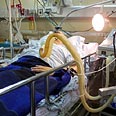
'The biggest paradox might be the stronghold on life.'
צילום: סבסטיאן שיינר
Dying with dignity
New euthanasia law provides breakthrough for synagogue-state relations
For some reason the media insists on calling it the "Euthanasia Law," but in fact the new law explicitly prevents exactly that.
This is not the only paradox that exists with regard to the care of the terminally ill. Wednesday the Knesset completed legislation on the issue, based on a proposal by a committee of dozens of experts, doctors, rabbis, philosophers, and theologians representing a wide swath of Israeli society.
Orthodox and Reform, atheists and religious Jews, doctors and nurses worked together in unprecedented fashion, under the guidance of Committee Chairman Rabbi Dr. Steinberg to create a proposal text for a revolutionary law on a sensitive and painful issue.
There are two reasons to view the new law as an important breakthrough in the field of medical ethics and the relationship between society, religion and the state of Israel.
The first reason is related to the way the law was passed. In practice, Israel is the first country in which "religious" and "secular" elements managed to produce a document agreeable to virtually all sides about treatment of the terminally ill.
The second reason touches on original, creative ideas that have no comparison in other places. Time will tell if we have indeed managed to be a "light unto the nations" with regard to medical ethics.
For the first time, the new law recognizes "pre-existing instructions." This is a document signed by a healthy person asking doctors not to employ resuscitation or life-support techniques should the person be stricken with a terminal condition, such as severe brain damage following a serious car accident.
Last wills and testament documents are mentioned in the old laws of many countries, including the United States. But the world has not necessarily encouraged them. For instance, a recent poll in Spain revealed that only a small number of people gave explicit instructions to doctors.
It is praiseworthy that the law recognizes that for the sake of human dignity, "early instructions" are a meaningful expression of human dignity, freedom and rights to medical treatment and humanitarian aid.
Passive euthanasia
The new law recognizes the rights of family members and other support personalities, such as personal physicians, to reconstruct the will of terminal patients who have lost their mental faculties.
The law requires doctors to notify their terminal patients – those expected to live six months or less – about their life-threatening condition, and to clarify whether or not they are interested in artificial life support. No steps will be taken to actively shorten a patient's life (euthanasia).
I have serious doubts as to whether this change will improve things for the terminally ill. Not all patients want to know they are close to dying, and many recoil at being categorized as "for life" or "for death."
But I am not sure we are sufficiently immune to the "slippery slope" phenomenon, which can lead to the neglect of patients not wanting their lives to be actively extended.
The most courageous idea the Steinberg Committee recommended relates to disconnecting terminal patients from life-support machines. They proposed connecting the machines to timers that would be renewed every few days.
If a patient expresses a wish to die, the machines will not be cut off (which would violate Jewish law, according to some rabbis), but the life-support timers would be allowed to run out.
Orthodox objections
Despite the fact that the new law conforms to even strict interpretations of Jewish law, ultra-Orthodox Knesset members voted against it at the last minute. The issue brings to mind the "Abortion Law" that also conformed to Jewish Law, proposed by the left-wing Ratz Party but rejected by Orthodox Knesset members.
The great sensitivity of many ultra-Orthodox rabbis to human suffering and human life leads them to speak with two voices: One legalistic and lenient (compared to other religions), the other a voice of stories and explanations that creates a behavioral ethos that is demanding and idealistic.
One of the most significant paradoxes is the fact that many patients view doctors as the "enemy," because the latter sanctify the value of human life.
In the eyes of many, it would be better for terminal patients to die a quick, immediate death rather than slowly wither away connected to some machine.
As much as the argument about the "right" to die with dignity drives the wheels of the current legislation, the Steinberg Committee was wise enough to affect a revolution in the world's perception, and to emphasize the right of terminally ill patients to fight for their lives until the very last moment.
According to the new law, as long as a patient's life expectancy diminishes – from months to weeks to days – the patient will have the right to forego more and more medical treatment.
And there is another paradox: If a patient’s suffering in short, for he indeed does want to die, we will be able to allow him to die and to relieve his suffering.
But non-terminal patients sentenced to long years of suffering will not have the right to forego life-saving medical treatment.
The list of paradoxes is much longer than this. The biggest paradox might be the stronghold on life, as well as values such as love, hope, faith, human dignity and mutual respect; a devotion that is occasionally heroic, against all odds, in the presence of death itself as well as tortuous suffering that is even worse than death.
From this point of view, it seems the new law is the best possible option to deal with the worst moments of life. We must praise the fact that the law was reached with such wide-ranging public agreement.
Dr. Yehiel Bar-Ilan is a senior lecturer at Tel Aviv University










